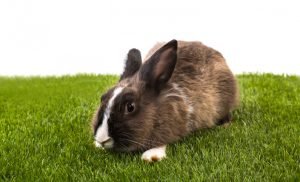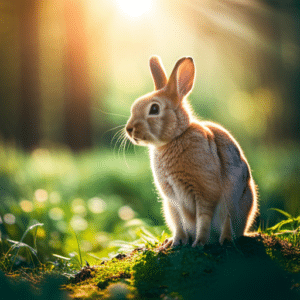Getting a pet rabbit is an exciting experience, but it’s also important that you’re aware of the many things you need to consider before taking on this wonderful responsibility.
Rabbits are not just small and cuddly animals – they require regular exercise, special diets, plenty of attention, and potential medical treatments as well.
To ensure your bunny is happy and healthy for years to come, make sure you educate yourself about the breed you choose, understand their needs, and be prepared for any possible mishaps along the way.
In this blog post, we will provide everything from general info on how rabbits should fit in your home, to feeding tips and tricks to help keep your bundle of fluff fun-loving. Read on if you’re considering getting a fluffy new furry friend!
What do I need to know before buying a rabbit as a pet?
Rabbits make great and adorable pets, but before you decide to bring one home, there are a few important things you need to know.
Firstly, rabbits can live for up to 10 years, so it is a long-term commitment.
Secondly, they require a fair amount of daily exercise, so be prepared to give them plenty of space to move around.
Thirdly, rabbits have delicate digestive systems and need a diet that is high in fiber with plenty of hay.
Lastly, they are social animals and need plenty of socialization and attention.
With all these considerations in mind, a rabbit can make a wonderful addition to your family.
Are rabbits hard to take care of?
Rabbits are often seen as a cute and cuddly pet option, but some people may wonder if they are difficult to take care of. While rabbits do require some special attention, they can make great pets with the right care.
For starters, rabbits need plenty of exercise and should have a large enough living space to run and play. They also require a healthy diet of hay, vegetables, and limited amounts of pellets.
Additionally, rabbits need regular grooming to maintain their coat and prevent matting.
While it may take some extra effort to care for a rabbit compared to other pets, their playful personalities and adorable appearance make it well worth it.
Are rabbits good indoor pets?
Rabbits are an adorable and charming addition to any household, but are they good indoor pets?
Although they may not be as common as dogs or cats, rabbits can make wonderful indoor companions for those who are willing to put in the time and effort to care for them properly.
With their soft fur and floppy ears, rabbits are undeniably cute, but they also require a significant amount of attention and care. They need a lot of space to move around and exercise, as well as a proper diet and regular veterinary check-ups.
If you’re looking for a low-maintenance pet, a rabbit might not be the best choice, but if you’re willing to put in the effort, you’ll be rewarded with a loyal and loving companion.
Are rabbits beginner pets?
Rabbits are often considered ideal for first-time pet owners. They are cute and cuddly, relatively easy to care for, and less demanding compared to dogs and cats.
Unlike most other small pets, rabbits thrive on social interaction with humans and other rabbits. They love to have their heads scratched and to be petted, making them perfect for children. Plus, for those who may have limited space, rabbits can easily adapt to living in small homes.
However, it’s important to note that even though they tend to be low maintenance, rabbits still require proper care and attention to ensure they are healthy and happy.
Potential rabbit owners should do their research before bringing one home to ensure they provide a loving and suitable environment for their new furry friend.
Are rabbits expensive to keep?
Rabbits are a popular pet choice for many households, but one question that often arises is whether they are expensive to keep. The answer to this question is not straightforward, as the cost of rabbits can vary depending on several factors.
Some of these factors may include the cost of the rabbit itself, housing and environmental needs, food, veterinary expenses, and any additional supplies or toys that may be necessary.
While rabbits can be a more affordable pet choice compared to larger animals like dogs, it is important to carefully consider their needs and expenses before deciding on bringing one into your home.
How do you clean a bunny?
Bunnies are adorable pets that provide endless entertainment and affection. However, keeping them clean can be quite challenging. Bathing a bunny is not recommended, as it can be stressful for them and even cause health issues.
Instead, you can spot-clean your bunny using a damp washcloth, focusing on the areas that tend to get dirty, such as the feet, bottom, and face. Additionally, you can use a soft-bristled brush to remove any loose fur and prevent matting.
It’s important to keep your bunny’s living area clean as well, as a dirty environment can lead to health problems. Regularly removing soiled bedding and wiping down surfaces with a pet-safe cleaner can help keep your bunny happy and healthy.
Do pet rabbits smell?
If you’re considering adding a pet rabbit to your home, you may be wondering about potential odors. While rabbits do produce feces and urine, which can contribute to unpleasant smells, these can be easily managed with proper care and maintenance.
One key to keeping pet rabbits from emitting strong odors is to keep their living space clean and dry. This means removing soiled bedding, wiping down surfaces, and providing fresh food and water regularly. You may also want to consider litter training your rabbit to make cleanup a breeze. Overall, with a little effort and attention, a pet rabbit should not emit any noticeable smells.
Do pet rabbits bite?
As with any animal, there is always the potential for biting. However, pet rabbits are generally not known for being aggressive and are considered to be gentle creatures.
If a rabbit does happen to bite, it is usually because they are scared, being handled improperly, or feeling threatened in some way.
With proper handling and socialization, the likelihood of a pet rabbit biting is greatly reduced. It is important to remember that every animal has a unique personality and behavior, so it is important to pay attention to your rabbit’s body language and behavior to avoid any potential biting incidents.
Do rabbits sleep at night?
Rabbits are fascinating creatures that have always been associated with cuteness and playfulness.
One interesting question that often arises among rabbit enthusiasts is whether these fluffy animals sleep at night. The answer is yes, rabbits do sleep at night, but not in the same way that humans do.
They are crepuscular animals, which means they are most active during the early morning and late afternoon. Therefore, it is common for rabbits to take short naps during the day and then sleep more deeply at night.
If you’re a proud owner of a pet rabbit, you might notice that they often flop down for a nap during the day and then become more active at night. So, although they may look adorable while they’re resting, these furry creatures still need their beauty sleep!
Do rabbits need vaccines?
Rabbits make great pets, but many owners don’t realize that these fluffy creatures need vaccines just like cats and dogs. Vaccines protect rabbits from various deadly diseases, and they are crucial for maintaining their overall health.
The most common vaccines for rabbits include those for Myxomatosis, Rabbit Hemorrhagic Disease Virus, and Caliciviruses. These diseases are highly contagious and can be fatal, so vaccinating your furry friend is a must. In addition to getting vaccinated, it’s also important to keep your rabbit’s living space clean and free of any potential hazards.
By providing proper care and medical attention, you can help your beloved bunny live a long and healthy life.
What fresh foods can bunnies eat?
Bunnies are adorable, furry creatures that need a lot of attention and care. When it comes to their diet, it is important to know what fresh foods they can eat. The good news is that bunnies can indulge in a variety of fresh foods, including leafy greens like kale, lettuce, and spinach.
They also have a sweet tooth for fruits like apples, bananas, and berries. However, it is important to remember that not all fresh foods are safe for bunnies to eat. For example, some fruits like grapes and avocados can be harmful to their health.
It is important to do research and consult with a veterinarian to ensure that your bunny is eating a healthy and balanced diet.
How long will a pet rabbit live?
If you’re considering adding a pet rabbit to your family, one important factor to keep in mind is their lifespan.
On average, pet rabbits can live anywhere from 8 to 12 years, which is a considerable commitment. However, with proper care and maintenance, some rabbits have been known to live up to 14 years or more.
Like any animal, the lifespan of a rabbit can be impacted by factors such as genetics and environment. To ensure your furry friend lives a long and healthy life, it’s important to provide them with a nutritious diet, regular exercise, and regular vet check-ups.
With the right care and attention, a pet rabbit can make a wonderful and beloved companion for years to come.
Are rabbits intelligent?
Many people might not think of rabbits as particularly intelligent animals. After all, they spend most of their time hopping around, nibbling on grass, and burrowing into the ground.
However, recent studies have shown that rabbits are quite clever creatures. They have excellent memories, can learn from previous experiences, and have even been known to take on responsibilities such as protecting their young from predators.
Additionally, rabbits have a sophisticated system of communication that can involve body language, vocalizations, and even scent marking.
So the next time you come across a rabbit in the wild or as a pet, don’t underestimate its intelligence!
The Bottomline: Getting a pet rabbit: What to Expect?
Congratulations on your new furry friend! There’s a lot of work and responsibility that goes into being a pet parent, but there’s also a great deal of joy and reward. Not only are rabbits sweet and lovable, but they are incredibly social animals that will always be there to keep you company.
Hopefully, this blog has given you the tools and information you need to care for your rabbit in the best way possible. Show them lots of affection and patience as you embark on your journey together! With time, patience, love, and proper care, both of you will find yourselves forming strong bonds with one another—bonds that will last for years to come!



